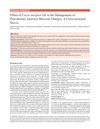 January 2023 in “International journal of Ayurveda and pharma research”
January 2023 in “International journal of Ayurveda and pharma research” The herbal shampoo is effective and safe for use.
 March 2012 in “Daehan hwajangpum hakoeji/Daehan hwa'jangpum haghoeji”
March 2012 in “Daehan hwajangpum hakoeji/Daehan hwa'jangpum haghoeji” The cream with plant components increased skin collagen and the hair tonic promoted hair growth in mice.
 January 2024 in “International Research Journal Of Modernization In Engineering Technology And Science”
January 2024 in “International Research Journal Of Modernization In Engineering Technology And Science” Licorice helps with acne, eczema, dandruff, hair growth, and skin health but may raise blood pressure.
27 citations,
June 2017 in “Expert opinion on investigational drugs” New anti-acne medications are being tested to offer alternatives to current treatments.
March 2022 in “INDIAN JOURNAL OF APPLIED RESEARCH” The Hibiscus shampoo is effective, safe, and free from harmful preservatives.
 January 2025 in “Burns & Trauma”
January 2025 in “Burns & Trauma” Titanium dioxide nanoparticles can help heal wounds faster and better.
 October 2023 in “International journal of biology, pharmacy and allied sciences”
October 2023 in “International journal of biology, pharmacy and allied sciences” Henna helps wounds heal faster and better.
3 citations,
January 2022 in “International Research Journal of Ayurveda & Yoga” Psoralea corylifolia (Bakuchi) is effective for treating various health issues, especially skin disorders.
 January 2024 in “Journal of Pharmacognosy and Phytochemistry”
January 2024 in “Journal of Pharmacognosy and Phytochemistry” Rosemary hair serum promotes healthier, stronger, and shinier hair.
1 citations,
January 2010 in “Acta Chirurgica Latviensis” Inflammation in psoriasis may trigger antimicrobial peptides and cell death.
 May 2024 in “Journal of colloid and interface science”
May 2024 in “Journal of colloid and interface science” The hydrogel helps skin heal by encouraging new blood vessel growth.
 2 citations,
December 2021 in “World journal of dentistry”
2 citations,
December 2021 in “World journal of dentistry” Coconut oil effectively treats sore gums from new dentures and is safe, affordable, and heals quickly.
 5 citations,
July 2023 in “International journal of biological macromolecules”
5 citations,
July 2023 in “International journal of biological macromolecules” The new wound dressing material speeds up healing, fights infection, and outperforms traditional dressings.
 1 citations,
April 2019 in “Journal of Investigative Dermatology”
1 citations,
April 2019 in “Journal of Investigative Dermatology” Cold atmospheric plasma may speed up wound healing and control infections.
 6 citations,
November 2018 in “Antimicrobial agents and chemotherapy (Print)”
6 citations,
November 2018 in “Antimicrobial agents and chemotherapy (Print)” Fluconazole can cause hair loss, but the exact cause is unknown.
8 citations,
November 2018 in “BMC Pulmonary Medicine” A 70-year-old woman with bronchiectasis developed a rare immune disease due to a bacterial infection, requiring a difficult balance of treatments.
January 2015 in “프로그램북(구 초록집)” Epiduo® is an effective first-line acne treatment that reduces inflammation and combats antibiotic resistance.
 April 2018 in “Journal of Investigative Dermatology”
April 2018 in “Journal of Investigative Dermatology” Obesity can weaken the skin's ability to fight infections because fat cells stop and reduce the infection-fighting properties of nearby stem cells.
 April 2018 in “The journal of investigative dermatology/Journal of investigative dermatology”
April 2018 in “The journal of investigative dermatology/Journal of investigative dermatology” Double-stranded RNA helps regenerate hair follicles by increasing retinoic acid production and signaling.
 April 2023 in “International journal of pharmaceutical sciences review and research”
April 2023 in “International journal of pharmaceutical sciences review and research” The F2 Emulgel with Tridax procumbens extract showed good physical properties and antimicrobial effectiveness for wound healing.
3 citations,
April 2012 in “Current Research in Pharmaceutical Sciences” Fenugreek has many health benefits, including antimicrobial and anti-inflammatory effects.
 January 2022 in “Social Science Research Network”
January 2022 in “Social Science Research Network” A special coating was made for artificial hair fibers that can slowly release silver ions for up to 56 days, providing long-term protection against bacteria and inflammation.
 106 citations,
July 2013 in “Advances in wound care”
106 citations,
July 2013 in “Advances in wound care” UV radiation can help sterilize wounds and promote healing but requires careful use to avoid damaging cells.
 2 citations,
August 2017 in “British Journal of Dermatology”
2 citations,
August 2017 in “British Journal of Dermatology” Hair loss in Cronkhite-Canada syndrome may be due to an autoimmune response.
 January 2024 in “Journal of Microorganism Control”
January 2024 in “Journal of Microorganism Control” The antibacterial toner can effectively kill acne-causing bacteria by penetrating skin plugs.
Banana plants have many health benefits, including reducing ulcers, infections, pain, high blood pressure, and more.
 77 citations,
January 1989 in “Clinical Infectious Diseases”
77 citations,
January 1989 in “Clinical Infectious Diseases” Toxic Shock Syndrome progresses quickly, often involves multiple organs, and is linked to Staphylococcus aureus toxins, with treatment options available but diagnostic challenges remaining.
26 citations,
January 1990 in “Mycoses” Most tinea capitis cases in Rotterdam were caused by Trichophyton violaceum, mainly affecting Moroccan immigrant children.
 August 2018 in “bioRxiv (Cold Spring Harbor Laboratory)”
August 2018 in “bioRxiv (Cold Spring Harbor Laboratory)” Existing drugs, including a blood pressure medication, show promise as new treatments for influenza.
 November 1996 in “Inpharma Weekly”
November 1996 in “Inpharma Weekly” Lotion with piroctone olamine and triclosan improves hair loss in men.





















